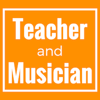Teacher AND Musician?
Welcome to my blog. The obvious (and somewhat expected) thing for me to do here is to tell you why I’m starting this blog. Yes, I’ll do that but I want to take a minute to explain the title before I get to its purpose.
I am a big believer that Music Education in the United Kingdom has been pulled away from its purpose. The increasingly pervasive ‘results culture’ in this country has dragged Music away from an exciting subject that allows students to communicate with their own musical voice and replaced it with an overly prescriptive activity that barely represents what students identify as ‘music’. Learning about music shouldn’t happen through verbal discussions, worksheets and practical activities that simply seek for students to replicate a very pre-set idea.
Music should be taught musically (thanks to Keith Swanick for that one). If my students are going to learn about a perfect cadence, they’re going to learn about it a lot more thoroughly and enthusiastically if they realise that they need to learn it – that they want to learn it. They may be writing a song and can’t find a way to end it…
Student: “Er… sir… we’ve written this [plays song] but can’t figure out which chord to end on”. Teacher: [Whilst playing I-V-I] “Have you tried a perfect cadence?”.
Student: “What’s that?”
Teacher: “It’s when you play the dominant [plays the dominant triad] followed by the tonic [plays the tonic triad]. So your last chorus would become [plays their chorus back with a perfect cadence at the end].”
This sort of discussion leads to a musical discourse where the notes played are far more important than the words said. Not to say that the students wouldn’t learn the keywords, vocabulary, etc – they’ll simply learn them at a time of their choosing rather than mine. In fact, I’d dare say that they would end up using these words more because they have the musical experience to understand the words in the first place.
Musical Futures has done a brilliant job of getting this idea into the thoughts of Music teachers. Unfortunately, far too many of teachers only read the first chapter of the first teacher resources and decided that they understood the model. They didn’t take the key principles to heart and, as a result, simply put a few units here and there based on ‘Stage 1’ of the ‘Informal Learning Model’ and claimed that they did Musical Futures. Until students and teachers are able to have musical conversations musically, the whole idea is lost.
So, that’s basically the reason for ‘Teacher and Musician’ as a title. I’m trying to keep myself in check. I’m trying to remind myself that I shouldn’t just be playing the role of ‘teacher’ in my lessons, I need to keep in the role of ‘musician’ because there simply aren’t enough words to teach these concepts. To put a bit of a Zen spin on it, the two roles together are powerful, separate they are weak.
That’s just the title though. The reason for the blog is actually quite simple… Come September, I hope that I’ll be thinking like this in every lesson that I teach and I want to use this blog as a method of keeping an eye on that. Don’t think for one minute that this will just be a collection of lesson evaluations (no way do I have the time for that!) but it will be a place for reflection. I’ll be asking myself how I’ve been a musician when I’ve been teaching. I’ll be reflecting on how effective this system actually is (or is it just a nice idea?). Finally, I would love to hear the thoughts of other musicians in education on this topic and hear their musings on how musical they’ve been.
Here’s looking forward to a musical year!

